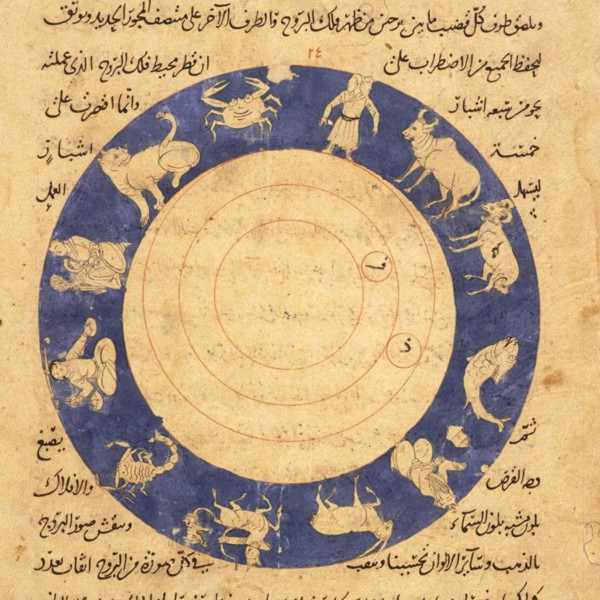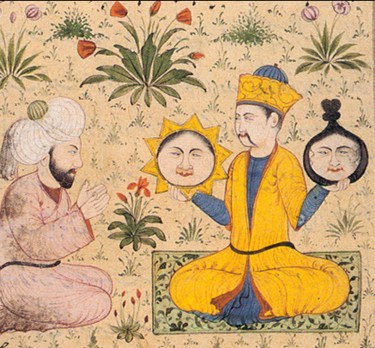This states very well the conclusion that I have myself reached, that the highest of the celestial spirits are indeed angelic and part of the divine plan and organization of the Cosmos. Far from being somehow in competition with God, as the orthodox would have it, God himself established the Cosmos and set up the planets and stars with a key role in organizing and governing the universe. But of course this important role is played not by the physical bodies of the planets and stars but by the archangelic celestial spirits. These spirits are the direct conduits for the manifestation of divine power in this world. The epistle then notes that to truly understand the influences of the celestial spirits, i.e. astrology, requires both a high degree of knowledge and divine inspiration.
"So, whenever they wish to get closer to some star or soul, they perform the rituals which occurs to them are appropriate to its nature. And then, they ask for waht they need and what is inside [the star or soul], under its power...yet without turning their attention to anything related to astrology, then the influence of this will be weak...Likewise, whenever they perform [actions] and follow the method of astral elections so as to solicit the fulfillment of the need, without observance of the natural actions {i.e. without ritual} the influence for the satisfaction [of the need] will be weak as well...And they [those skilled in magic] allege that if they combine the two things [volition and nature, i.e. ritual and elections] with one another and follow the two paths in the quest for their needs, the nature of the star and its volition will join together for them."
"On Magic" page 127.
Here we confront the paradox of the astrological magician who combines the often contradictory nature of the astrologer and the magician. The magician is focused on will, here rendered as volition. The magician operates according to their will and their desire, their magic is an expression of will. This explains why magicians can often be hostile to elections, i.e. astrological timing, because they cannot express their desire freely, but must wait on the appropriate astrological moment. But the astrologer can also err and rely solely on elections. Astrologers then and now can be wary of magic and unwilling to express their will in ritual. But as the epistle notes, the greatest power results from conforming to the nature, that is to say the will of the celestial spirit and doing ritual at an astrologically appropriate time.
"They have considered the cities which are allotted to a certain star, in agreement with the experiences that had befallen them, as it is found and mentioned in the books of astrology. And they have distinguished them and observed which [cities] are under it's [i.e., the star's] authority when it is in its exaltation, which are under its authority when it is in its [sign] and which are under its authority when it is in its decan. And when it was favorable for them to keep with those conditions and to scrutinize what befell them [the cities], they waited for the star to come into some of these dignities and they began construction of a temple for that star in the city for which this dignity had been determined. And they represented that temple with the image by which it [the planet] was configurated when it was in one of its dignities, together with images from amongst the predominant stars and the images that are in the same degree. And they placed them in that temple. And they have prescribed a norm of rituals...And they have annexed to it the mention of the issues which it is appropriate to ask for when it is in one of its dignities...And whenever some need occured to a man of their people he sough to be satisfied for that and asked which temple it was attributed to. And as soon as he knew, he make a vow to that temple corresponding to it."
"On Magic" pages 128-9.
This explains to us the deeper strata of both theory and practice that underlie the creation of talismans. Rather than being focused on imbuing various types of jewelry with some sort of energy, we can see that talisman making derives from a larger spiritual practice, similar to the astral religion of the Harranian Sabians. We can see similar practices in traditional Indian religion, where one can visit a temple of Jupiter or the other planets. The epistle then discusses the decoration of a celestial temple,
"They attired the twelve zodiacal signs with their names. And they manufactured an image for the seven planets, each one worked out with the appropriate material, such as the Sun with gold, the Moon with silver, Saturn with iron, Jupiter with quicksilver, Mars with copper, Venus with tin and Mercury with lead."
"On Magic" page 134.
This is a very interesting listing of planetary metals, quite unlike the "standard" listng of Saturn, lead; Jupiter, tin; Mars, iron; Sun, gold; Venus, copper; Mercury, mercury; Moon, silver. But we can find other aberrant listings, for example, Picatrix Bk II, ch. 10 has Saturn with iron and gold, Jupiter, lead (!!!), Mars, ruby, Venus, red brass, Mercury, mercury, tin, and Moon silver. Picatrix Bk III, ch 7, says Saturn is lead, Jupiter, tin, Mars, bronze, Sun, gold, Venus gold/silver alloy, Mercury, fixed mercury, Moon, silver.
While there are lots of interesting details, like the aberrant planetary metals listing, what is more significant about the epistles of the Ikhwan al-safa is the glimpse into a world different from that of the modern magic user or even the Solomonic grimoires of the later Middle Ages and early modern periods. Rather than a magician centered world peopled with spirits that the magician can command, the celestial spirits play a key and exalted role in the Cosmos itself. Astrological magic, at its roots, was a religious and spiritual practice and I feel myself increasingly pulled towards these root practices and philosophies.


